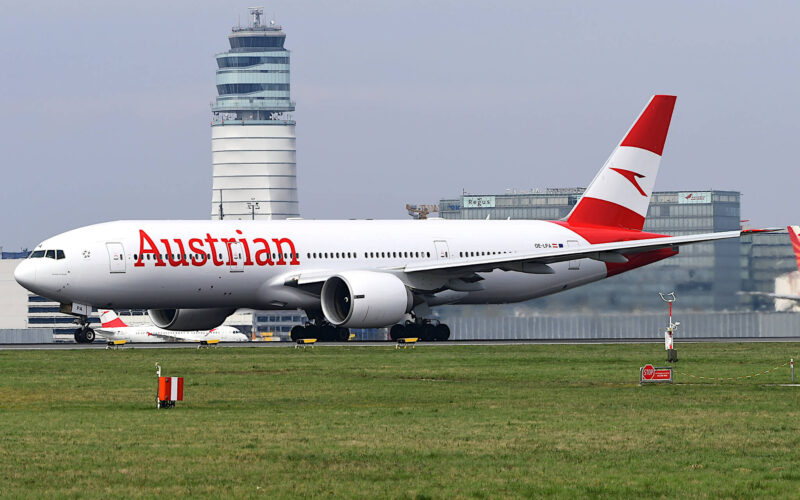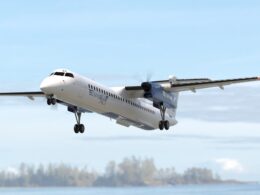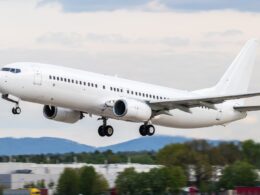The Austrian government will introduce a set of taxes on flight tickets, as it aims to combat aviation’s emissions footprint in the country. The taxes were first introduced in January 2020, under a coalition agreement by the Austrian People’s Party (ÖVP) and the Green Party following a snap election in the country. Now, the new regulations are being introduced together with the rescue package to Austrian Airlines,
Previously, taxes on flights ranged from $3.9 (€3.50) to $19.7 (€17.50) on short-haul and long-haul journeys, respectively. Instead, Austria will now tax flights at $13.50 (€12), no matter their distance.
Furthermore, short-haul flights that are under 350 kilometers (217 miles) will be taxed at $33.7 (€30) per flight.
The new set of regulations also includes an anti-dumping policy on ticket prices. Companies would be unable to increase demand by filling the market with cheap tickets, as they would have to cost at least as much as the taxes and charges for the flight. While there is no minimum set price as of now, the Minister of Transport of Austria Leonore Gewessler predicted that a round-trip to Austria would cost at least $45 (€40) per person. The anti-dumping rules were put in place to stop “certain excesses and their social and ecological consequences,” stated the Austrian government.
In July 2019, Carsten Spohr, the chairman of Lufthansa (LHAB) (LHA) , the parent company of Austrian Airlines, stated that the ticket prices of Europe’s low-cost carriers are “economically, ecologically and politically irresponsible.”
All in all, both Austrian Airlines and Lufthansa (LHAB) (LHA) have had their fair share of struggles with low-cost carriers. Austrian Airlines’ chief executive Alexis von Hoensbroech directly addressed Ryanair’s Michael O’Leary in November 2019, stating that he was “wrong if he thinks that he can overtake us here in Vienna.”
“We will not retreat a single millimeter and will maintain our premium strategy,” back then added the Chief Commercial Officer Andreas Otto.
Environmental pillar in the state-aid deal
The new set of regulations and taxes are a part of a rescue package for Austrian Airlines. Environmental issues play a major part in the deal. Including the new pricing policies, the Vienna-based carrier promised to increase its fuel efficiency by 1.5% and reduce its CO₂ emissions by half by 2030 or on average, spit out 8.5 kilograms of CO₂ per 100 passenger kilometers, rather than the current level of 9.5 kilograms. In addition, Austrian Airlines will transfer short-haul flights to rail, where the train infrastructure allows travelers to reach Vienna Airport (VIE) in “considerably less” than three hours of travel time.
The environmental measures employed by the Austrian government are following a similar trend around the world. For example, Air France also had to commit to reduce its CO₂ emissions, introduce more fuel-efficient aircraft and the clause that flights should use at least 2% of sustainable fuel by 2025.
“However, the objective is also to make sure that the airports in Austria’s provincial capitals continue to be connected to a Lufthansa (LHAB) (LHA) flight hub,” stated the carrier. Lufthansa’s (LHAB) (LHA) main hubs are in Brussels, Belgium, Frankfurt and Munich in Germany, Vienna, Austria and Zurich, Switzerland.
In total, Austrian Airlines is set to receive $676 million (€600 million) of aid: $338 million (€300 million) in the form of a 90% state-guaranteed loan (to be repaid by 2026), $169 million (€150 million) invested by Lufthansa (LHAB) (LHA) , and a further $169 million (€150 million) given by the Austrian state itself to cover COVID-19-related losses.
Initially, the airline predicted that it would need $864 million (€767 million) of liquidity to weather the turbulent skies of the pandemic, but an earlier restart of flying and cost-cutting measures lowered the burden of the crisis, noted Austrian Airlines.
However, even Lufthansa (LHAB) (LHA) will have strings attached to the rescue deal. If Vienna Airport (VIE) does not follow the same growth spur as Frankfurt (FRA), Munich (MUC) or Zurich (ZRH), Lufthansa (LHAB) (LHA) will have to pay a $169 million (€150 million) penalty fee. Moreover, if Austrian Airlines will be unable to repay back the $338 million (€300 million) loan, it will declare itself insolvent and will be fully taken over by the Austrian government, reported local media.
For now, though, the Austrian lawmakers will not touch the business directly and will not have representatives on the airline’s executive board. But if needs be, the government can appoint two people to the managing board of ÖLP, a private foundation that holds a majority stake in the airline. One of the two yet-to-be-determined individuals will also be granted a seat on the supervisory board of Austrian Airlines if such a scenario does develop.














